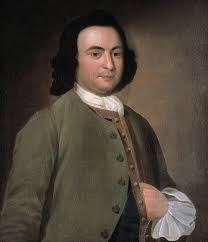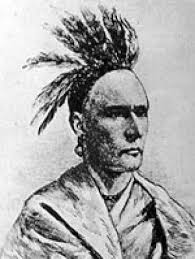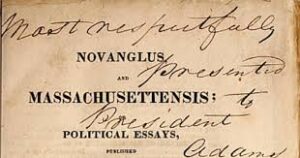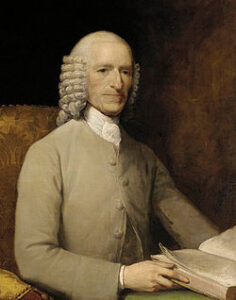Americanism Redux
February 6, your today, on the journey to the American Founding, 250 years ago, in 1775
Is life visible in all its forms in a few days? Yes, if you look at Virginia, the British colony.
* * * * * * *
(the site of Sarah’s operation)
After hearing the words “breast cancer” some weeks back, Sarah Eilbeck started dreading the arrival of today, 250 years ago.
The doctors were unanimous. It’s cancer in your breast, Sarah, and the only way out is to go in. Surgery. Full breast removal. The date for surgery is February 6. And now it’s here. Today.
Sarah’s family and closest friends will be with her for the operation. Some of them will stay for a few days afterwards. Following that, she’ll be tended by the family and, from the sixty enslaved people living on the plantation, one or two of the most trusted and medically skilled enslaved women will provide invaluable support. They’ll wash Sarah, change her bandages, keep watch for fever, make sure she’s getting enough food and water.
It’s going to be a rough time at the Eilbeck home on the banks of Mattawoman Creek in the colony of Maryland.
Pray for her.
* * * * * * *
(George Mason)
Today, George Mason’s thoughts are of two minds. He’s worried for his mother-in-law, undergoing surgery at her home along Mattawoman Creek. And yet, there are other things that demand his attention, things he’d never believed possible a year ago.
He’s writing a plan to organize Virginia’s Fairfax County militia into a fighting force. The plan will be their outline for war against the British Redcoats, if the current crisis comes to that. And each day that passes, it seems….
Mason knows more about courtrooms and political debates than he does about battlefields. His experience in the militia has been mostly honorific. Yet here he is, finishing a draft militia plan that will likely guide the county in the looming war.
“A well regulated Militia, composed of the Gentlemen, Freeholders, and other Freemen, is the natural Strength and only safe and stable security of a free Government,” states Mason in his plan.
He provides for companies to be formed of 68 volunteers. He then adds a very striking detail: once formed, these 68 men will vote on their officers “upon whose Justice, Humanity, and Bravery we can rely.” The privates choose their formal leaders.
He’s not done innovating.
Mason calls for a special unit apart from these companies. They will be skilled and capable with “Riphel Guns…(as) Marksmen or Light-Infantry” separate from other infantry and wearing “painted Hunting Shirts and Indian Boots or Caps.” They will function practically as “special-forces” in “special ops” do two centuries later.
Mason asks George Washington to review his draft militia plan. He admits to Washington that events seem to heading toward “more coercive and vindictive Measures.”
* * * * * * *
(of Gilbert’s dream, the Monongahela valley)
Gilbert Simpson sees his future life, a dream to him up to now, slipping away in front of him. And he can’t do a thing about it. Well, maybe there’s one more step to take, one last request for help.
“SR. This Coms To acquaint you of a Sceem…”
It’s Simpson’s awkwardly drafted introduction to a letter he writes and sends today, 250 years ago, to George Washington. Simpson is seated along the banks of the Monongahela River, the upper Ohio River valley. He’s writing more than four months after Virginia’s imperial governor Lord Dunmore has driven Native tribes from this region with a military expedition. That was the cause of Simpson’s dream of a better life on this seized land. No more.
In the letter Simpson angrily describes the actions of Thomas Cresap. Simpson says the new settlement here organized by Cresap is not accessible to him and other people. The remoteness of the place gives Cresap the power to control the settlement. Simpson wants Washington to visit the area and have the settlement located on lands that Washington owns. Simpson states that Washington’s lands are excellent for farming, industry, and an overall better quality of life.
But Simpson is a realist. He admits to Washington that “I Expect your business is Ergently upon other affairs Concerning the Good of Amerecay.”
Simpson seals the letter. He still has no answer as to how Cresap can be stopped.
* * * * * * *
(Logan)
Cresap is the subject of another man’s anger today, as readers of the Virginia Gazette learned two days ago in the current edition of the newspaper.
Logan, leader of the Native Mingo tribe that lost its land to Dunmore, gave a speech that is published by the Gazette’s printer:
“I appeal to any white man to say that he ever entered Logan’s cabin but I gave him meat; that he ever came naked but I clothed him. In the course of the last war, Logan remained in his cabin an advocate for peace. I had such an affection for the white people, that I was pointed at by the rest of my nation. I should have ever lived with them, had it not been for Colonel Cresap, who last year cut off, in cold blood, all the relations of Logan, not sparing women and children: There runs not a drop of my blood in the veins of any human creature. This called upon me for revenge; I have fought it, I have killed many, and fully glutted my revenge. I am glad that there is a prospect of peace on account of the nation; but I beg you will not entertain a thought that any thing I have said proceeds from fear! Logan disdains the thought! He will not turn on his heel to save his life! Who is there to mourn for Logan?–No one.”
Only a few days of distance separate Logan from Gilbert Stewart and their words traveling eastward by horse toward the Virginia coast.
* * * * * * *
(a later bound edition)
Outside of Virginia, in the colony of Massachusetts where the worst of the imperial-colonial crisis afflicts daily life, John Adams writes his second public essay as Novanglus. He’s hitting his stride against his opposing debater-in-print, the pro-imperial Massachusettensis, or his friend, Daniel Leonard.
Adams’s second Novanglus essay asserts that more than one source of power can exist in the same government. That’s totally opposite of the view expressed by Massachusetttensis. Adams states that such philosophers and commentators as Aristotle, Livy, and Harrington show that Great Britain is a limited monarchy and not an empire; the former allows for multiple power while the latter can never tolerate it. A limited monarchy has rule by law. An empire has rule by men. Adams holds up the colonial legislatures as the supreme power and lawmaker in the colonies. They have sovereignty over all issues on the lands that comprise the thirteen colonies, right up to the salt water’s edge on the eastern ocean coast.
Indeed, it is the 3,000-mile salt water expanse called the Atlantic, Adams declares, that separates colonial power in America from all other powers retained by the British government in England. Parliament rules the Atlantic and its own British Isles. The British monarch ties it all together as a sort of figurehead.
Let this system be the system in place and peace will be restored, according to Novanglus.
* * * * * * *
Remove 250 years from today and you find cancer in the human body, salt water on the planet Earth, and a daily life remarkably knowable.
Also
(the papers are in there somewhere)
The hopes of thousands of colonial-rights supporters in America lay over there, on a desk in Westminster in London, home of Parliament.
Their hopes are on the pages of the petitions, letters, and formal messages crafted with care at the colonial Congress met last fall in Philadelphia.
They arrived by ship in England weeks ago. Bureaucrats looked at them. Bureaucrats moved them from one pile and desk to another pile and desk. Bureaucrats muttered sentences and phrases as the dust settled on top the stacks. King George III never saw the papers because he didn’t care to see them. No one in the pro-empire Parliamentary majority cared, either.
All that work, for nothing.
* * * * * * *
(forget petitioning, he says)
Benjamin Franklin, lobbyist for several colonies, knows precisely the fate of the papers. He writes to tell colonial-rights supporters in Philadelphia not to bother with any more petitions. Stick to the economic boycott, advises Franklin. Hit them where it hurts, in the purse, the pocketbook, the bank account. Your worst enemies in Parliament and the imperial government believe the Congress will collapse because unity won’t last. Some good news too: not everyone thinks that, Franklin adds, “The Congress is in high Esteem here among all the Friends of Liberty, and their Papers much admired.”
The problem, and ultimately we’re back at the bad news, is that the foes far outnumber the friends.
* * * * * * *
(John Fothergill)
Speaking of friends, the Quakers in England are also called the “Friends” as a religious sect. And one of their most insightful leaders, John Fothergill, is reaching some disturbing conclusions by today, 250 years ago, which he expresses to Lord Dartmouth, a member of King George III’s government and advisor to Prime Minister Lord North.
Fothergill believes the entire crisis between the British imperial government and the American colonies boils down to this: the Americans demand repeal of the Coercive Acts before discussions on reconciliation, and the British refuse to repeal the Coercive Acts. Each side is dug in.
Further, he offers, “the only thing left for the generality of these devoted countrys is to look for superior protection. The great will always be the great, in every revolution that can happen; the poor will always be the heirs of misery, let who will be their superiors. A numerous, a very numerous part of both countrys, the middling people who bear all the Burthens, who produce all the strength and happiness of states, these must be the sufferers.”
“Should it however be determined to proceed with (armed) force to reduce the Americans to a different way of thinking, and subject them by hostile means, I most sincerely wish that the Enemies of my Noble Friend (Lord Dartmouth), if any such there are, may enjoy the power of issuing such a sanguinary commission.”
In other words, if the order to make war is to be given, Fothergill hopes that Dartmouth’s worst enemies, and not Dartmouth himself, are the ones compelled to do so.
History won’t judge the order-giver kindly.
For You Now
(a grain at a time)
Moments arise where the River takes complete command. The River reminds you who is really in charge. You don’t own this water. You are the vessel. The River is the river.
Time moves forward like a river, one minute ahead, one minute ahead, one minute ahead into hours, days, weeks, months, and years. There is nothing you can do about it as reality. Memory can take you backward. Reality will not and cannot. It goes forward, formed as time.
Sarah’s breast cancer is one of those moments in life when everything falls away and only one thing remains. You’ve probably had some moments like this. I have. The hard truth is—and you already know this—until we come to the final moment of the River, we’ll continue to have some times when everything falls away and only one thing remains.
There was a moment when Sarah was diagnosed and then told that the only thing left was the date of surgery to remove her breast. The time between those two events would have been excruciating, bizarre, surreal. At the arrival of the day of operation, Sarah’s instinct is to pray, hope, and be the best she can.
As a brother-like friend of mine once advised another brother-like friend of mine diagnosed with cancer, be the best patient in the hospital. I suspect Sarah heard something like this in her bedroom.
I can’t help but think the same sort of diagnosis-to-operation dynamic is also at work with the imperial-colonial crisis. Think about the insights from John Fothergill in today’s entry. He’s making a dark forecast. George Mason echoes him, at least with regard to the prospects of force. That’s a kind of diagnosis (which we’ve seen various versions of in prior entries). John Adams as Novanglus is offering a quasi-alternative, a rehabilitative treatment if not a cure.
For my part, I’ll return to my earlier words: you are the vessel and the River is the river.
Suggestion
Take a moment to consider this: do you have a diagnosis of the nation today?
(Your River)


















